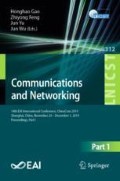Abstract
The observation data of Argo profile floats are very crucial for long-term climate change and natural variability, which reflect three-dimensional distribution of temperature and salinity in the sea. In order to solve the anomalies in the profile caused by uncertainties factors, this paper proposes a novel anomaly detection method for Argo profile floats using an improved trajectory clustering method to discriminate normal and abnormal. The proposed algorithm partitions Argo data into a set of line segments, and then clusters line segments to get rid of noisy data, finally recovers the line segments to the raw data accordingly. As a result, the proposed oceanic anomaly detection method subtly converts the sequence data into line segments for anomaly detection, which considers both positional relationship and trend of data source. Extensive experiments on real dataset from Argo floats verify that our method has better results under different conditions compared to existing methods such as LOF and DBSCAN.
Access this chapter
Tax calculation will be finalised at checkout
Purchases are for personal use only
References
Argo Profile Floats, 10 June 2019. http://www.argo.ucsd.edu [BL/OL]
Zhou, Y., Qin, R., Xu, H., Sadiq, S., Yu, Y.: A data quality control method for seafloor observatories: the application of observed time series data in the East China Sea. Sensors 18, 2628 (2018)
Brandsæter, A., Vanem, E., Glad, I.K.: Cluster based anomaly detection with applications in the maritime industry. In: 2017 International Conference on Sensing, Diagnostics, Prognostics, and Control (SDPC), Shanghai, pp. 328–333 (2017)
Kamikawaji, Y., Matsuyama, H., Fukui, K., Hosoda, S., Ono, S.: Decision tree-based feature function design in conditional random field applied to error detection of ocean observation data. In: 2016 IEEE Symposium Series on Computational Intelligence (SSCI), Athens, pp. 1–8 (2016)
Wong, A., Keeley, R.: Thierry Carval and the Argo Data Management Team. Argo Quality Control Manual for CTD and Trajectory Data (2019). http://dx.doi.org/10.13155/33951
Lee, J.G., Han, J., Wang, K.Y.: Trajectory clustering: a partition-and-group framework. In: Proceedings of the 2007 ACM SIGMOD International Conference on Management of Data, pp. 593–604 (2007)
Argo Data 10 June 2019. ftp://ftp.argo.org.cn/pub/ARGO/global/core/ [BL/OL]
Ester, M., Kriegel, H.P., Sander, J., Xu, X.: A density-based algorithm for discovering clusters in large spatial databases with noise. KDD 96, 226–231 (1996)
Breunig, M.M., Kriegel, H.-P., Ng, R.T., Sander, J.: LOF: identifying density-based local outliers. In: Proceedings of the SIGMOD Conference, pp. 93–104 (2000)
Acknowledgment
The authors would like to thank the anonymous reviewers for their helpful and constructive comments that greatly contributed to improving the final version of the paper. These data were collected and made freely available by the International Argo Program and the national initiatives that contribute to it (http://www.argo.net). This research has been partially supported by National Natural Science Foundation of China (No. 61871163 and No. 61801431), Zhejiang Public Welfare Technology Research Project (No. LGF20F010005) and Key Research and Development Program of Hainan Province (ZDYF2017006). Natural Science Foundation of Zhejiang Province (No. LY18F030006) and Open funding of Zhejiang Provincial Key Lab of Equipment Electronics.
Author information
Authors and Affiliations
Corresponding author
Editor information
Editors and Affiliations
Rights and permissions
Copyright information
© 2020 ICST Institute for Computer Sciences, Social Informatics and Telecommunications Engineering
About this paper
Cite this paper
Cai, WY., Liu, ZQ., Zhang, MY. (2020). Trajectory Clustering Based Oceanic Anomaly Detection Using Argo Profile Floats. In: Gao, H., Feng, Z., Yu, J., Wu, J. (eds) Communications and Networking. ChinaCom 2019. Lecture Notes of the Institute for Computer Sciences, Social Informatics and Telecommunications Engineering, vol 312. Springer, Cham. https://doi.org/10.1007/978-3-030-41114-5_37
Download citation
DOI: https://doi.org/10.1007/978-3-030-41114-5_37
Published:
Publisher Name: Springer, Cham
Print ISBN: 978-3-030-41113-8
Online ISBN: 978-3-030-41114-5
eBook Packages: Computer ScienceComputer Science (R0)

